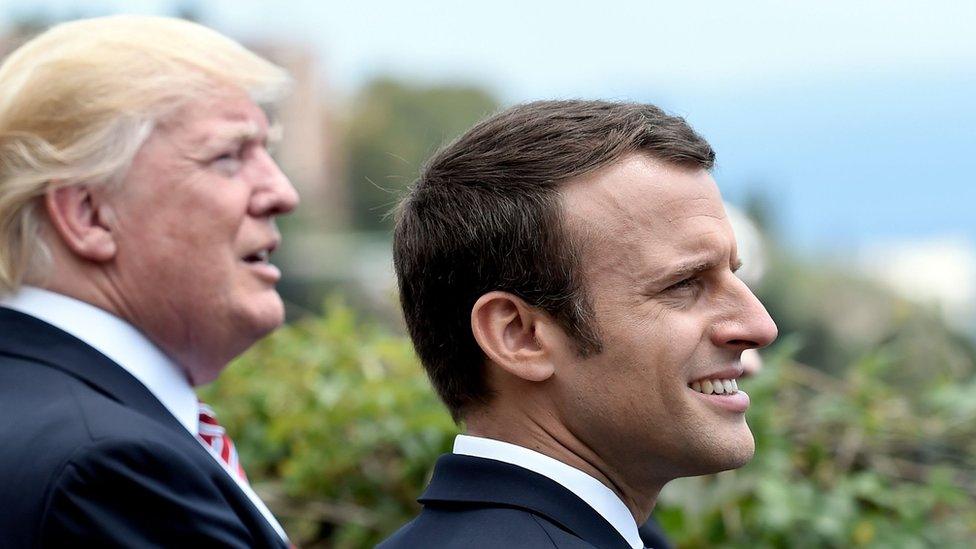France election: Macron party set for big parliamentary win
- Published
- comments
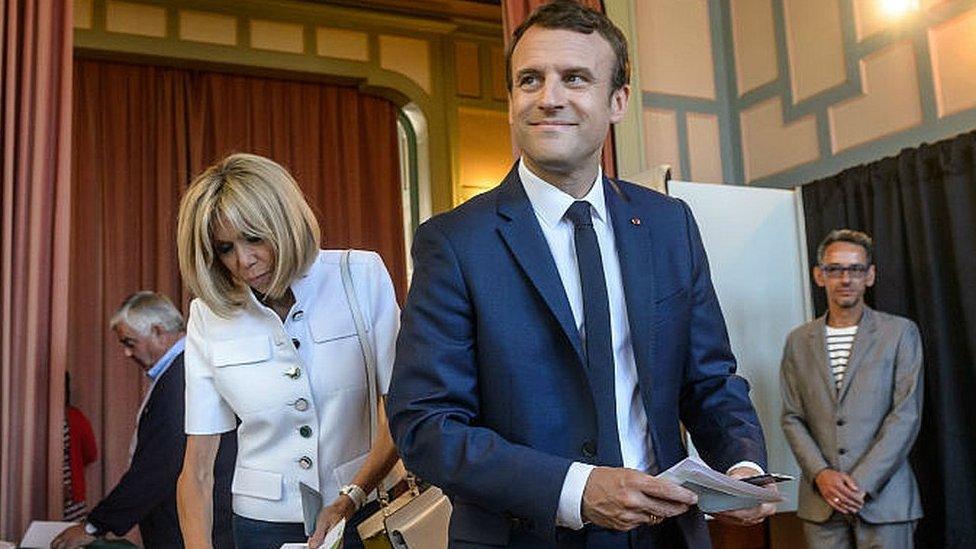
Emmanuel Macron needs a strong majority to push through his reforms
The centrist party of French President Emmanuel Macron looks on course to win a landslide victory following the first round of parliamentary elections.
Projections show La République en Marche (Republic on the Move) and its MoDem ally set to win up to 445 seats in the 577-seat National Assembly.
The Socialists, France's former ruling party, are seen losing 200 seats.
Traditional parties are urging voters to back Mr Macron's rivals in a run-off vote to avoid him monopolising power.
Mr Macron's party was established just over a year ago and many candidates have little or no political experience.
The final outcome will be decided in the second round of voting next Sunday.
What are the results?
With all the ballots counted, Mr Macron's LREM and MoDem won 32.3% of the vote.
The centre-right Republicans had 21.5%, while the far-right National Front (FN) had 13.2%, followed by the far-left La France Insoumise (France Unbowed) on just over 11%.

The Socialists, previously France's ruling party, and their allies won just 9.5%.
But turnout was sharply down, at 48.7% compared with 57.2% in the first round in 2012, which analysts said reflected a sense of resignation among Mr Macron's opponents.

Who is in the second round?
Only four seats were settled in the first round. In the run-off vote, the other seats will be disputed by the two top-placed contenders and any other candidate who won the support of at least 12.5% of registered voters in the district.
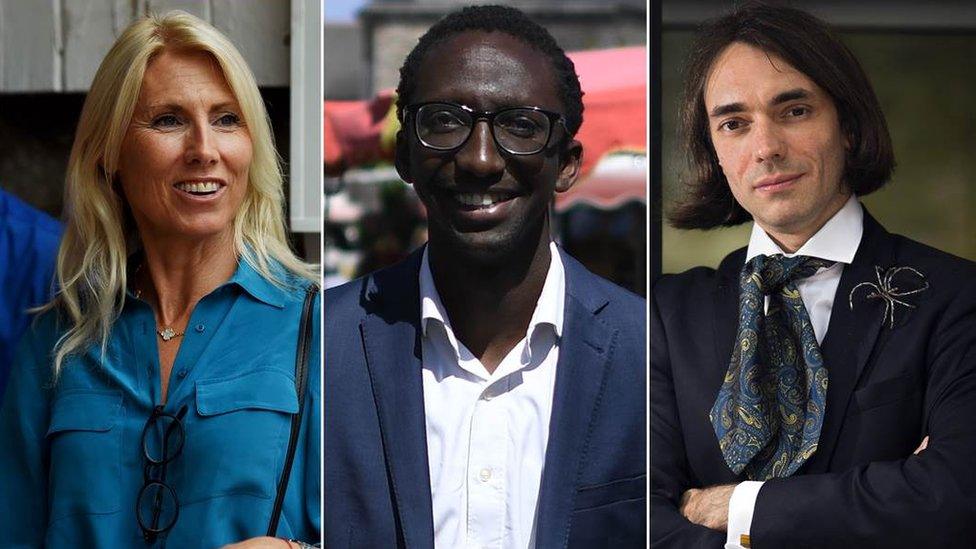
Among the LREM candidates who will compete in the second round are Marie Sara, Hervé Berville and Cédric Villani
Those include LREM candidates Marie Sara, a retired bullfighter who will compete against FN stalwart Gilbert Collard in Arles; a Rwandan refugee in Brittany, Hervé Berville, who will face the Republican Didier Déru; and Cédric Villani, a "mathematics evangelist" known for his unique dress sense - including large spider brooches - who will fight against the Republican Laure Darcos.
Manuel Valls, the unpopular Socialist ex-prime minister who was rejected as a candidate by both LREM and the Socialists, will face Farida Amrani, from the far-left France Unbowed, in Essonne.
The election took place amid heightened security after a series of devastating terror attacks in recent years.

French political map redrawn: Hugh Schofield, BBC News, Paris
There can be no disputing the extraordinary achievement of Emmanuel Macron. Yes, he has certainly had luck but he has also foreseen with uncanny clarity how - with the right moves at the right places at the right times - the map of French politics was waiting to be redrawn.
If the projections from the first round are sustained, then the change that is about to happen to the National Assembly is as big as the one that occurred in 1958 when Charles de Gaulle brought in the Fifth Republic.
Scores, hundreds, of new MPs will be arriving who have never set foot in a debating chamber of any kind, let alone the country's legislature.
It is all liable to bring a rush of blood to the head, and the greatest danger right now for Macron and En Marche is hubris. The victory is no doubt spectacular but so far it has all been electoral.
Phase two of the Macron master plan - actual reform - is the next challenge. And bigger.

What are the challenges for Macron?
Mr Macron, 39, defeated Marine Le Pen in the presidential run-off last month.
He needs a majority to push through the changes that he promised in his campaign, which include:
Budget savings of €60bn (£51bn; $65bn) in the next five years
Cutting the number of public servants by 120,000
Reforming the labour market and generous state pension schemes, bringing them into line with private schemes
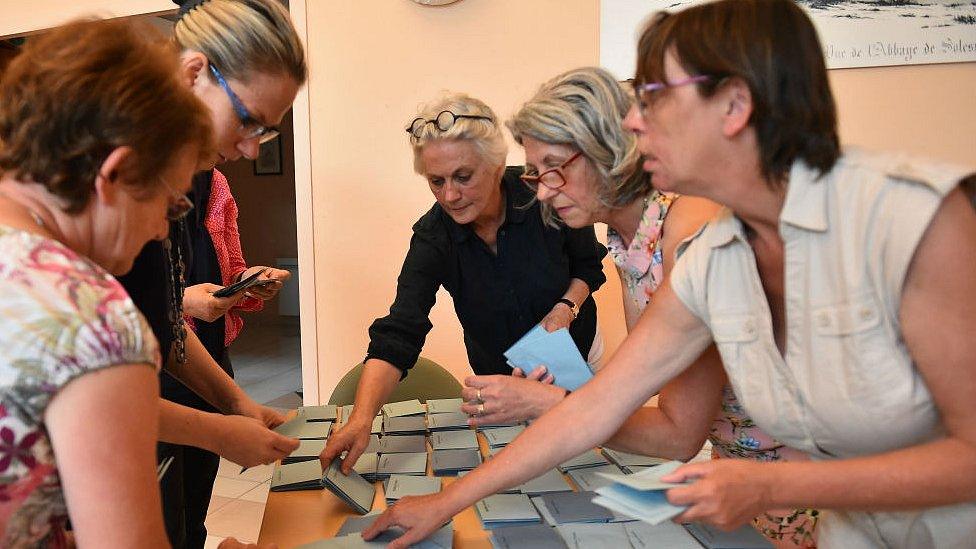
Turnout was low, despite claims that President Macron had re-energised the voting public
He has already left an impression around the world, in particular for standing up to US President Donald Trump on issues like climate change.
After the projections were announced, a government spokesman said voters had shown they wanted to move fast on major reforms.

What has the reaction been?
François Baroin, head of the Republicans, said the low turnout testified to the "deep divisions in French society" and was "extremely worrying".
FN leader Marine Le Pen blamed her party's poor performance on the low turnout, saying France's electoral system, which favours larger parties, needed to be reformed.
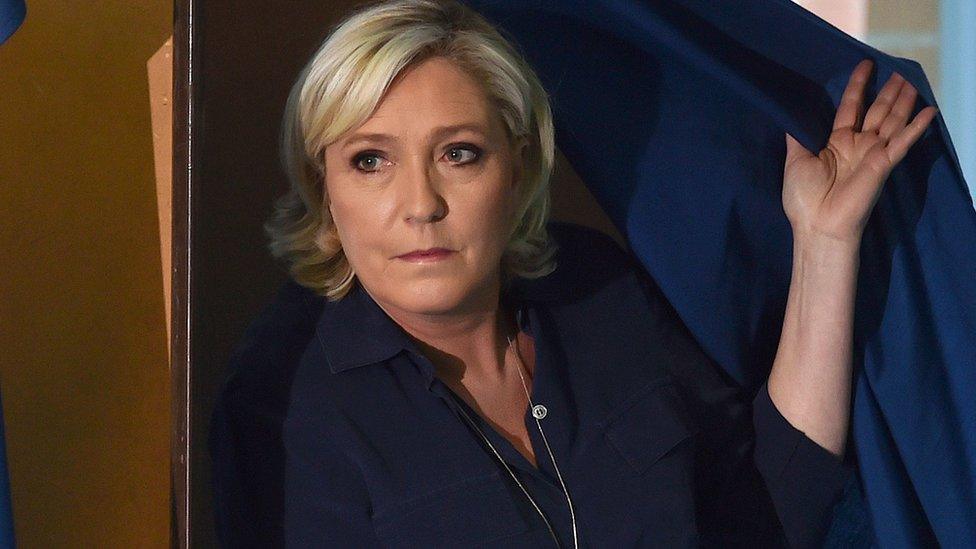
FN leader Marine Le Pen said the electoral system led to low turnout
"This catastrophic abstention rate should raise the question of the voting rules which keep millions of our compatriots away from the polling stations," she said.
Socialist leader Jean-Christophe Cambadélis, who lost his seat in the first round, warned voters against giving LREM an absolute majority next Sunday.
He said it would result in "virtually no real opposition and we will have a National Assembly without any real counterbalance, without a democratic debate and not worthy of that name".
Elsewhere, German Chancellor Angela Merkel - who, like Mr Macron, has a pro-EU stance - congratulated him on the "great success" of his party. It was a "vote for reforms", tweeted, external (in German) her spokesman, Steffen Seibert.

Who was eliminated?
The first round saw some political heavyweights knocked out.
Most of the big-name casualties were Socialists. Besides party leader Cambadélis, eliminated in Paris, their ill-fated presidential candidate Benoît Hamon lost in Yvelines, just west of Paris.
Other prominent Socialists knocked out included: Matthias Fekl (ex-interior minister), Aurélie Filippetti (ex-culture minister) and Elisabeth Guigou (previously European affairs minister, justice minister, social affairs minister).
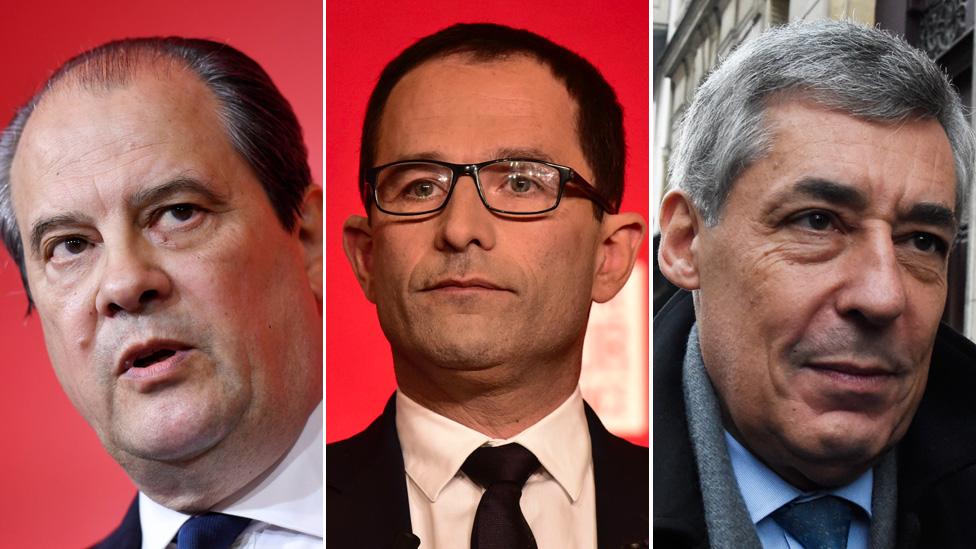
Prominent first-round casualties (L-R): Jean-Christophe Cambadélis, Benoît Hamon and Henri Guaino
The ex-leader of the Greens, Cécile Duflot, a former housing minister, was eliminated in Paris.
Two prominent FN politicians - party campaign manager Nicolas Bay and Jean-Lin Lacapelle - were knocked out.
And the big losers among the centre-right candidates were Senegalese-born Rama Yade and Henri Guaino, a former top aide to ex-President Nicolas Sarkozy.
Mr Guaino had fallen out with former Republican colleagues before the vote, and castigated voters in his central Paris constituency. "The electorate... just makes me want to throw up," he said. He labelled them "egotistical bobos (bohemians)" and conservative Catholic "bourgeoisie" like those who supported the Vichy French Pétain regime in World War Two.
- Published10 May 2017
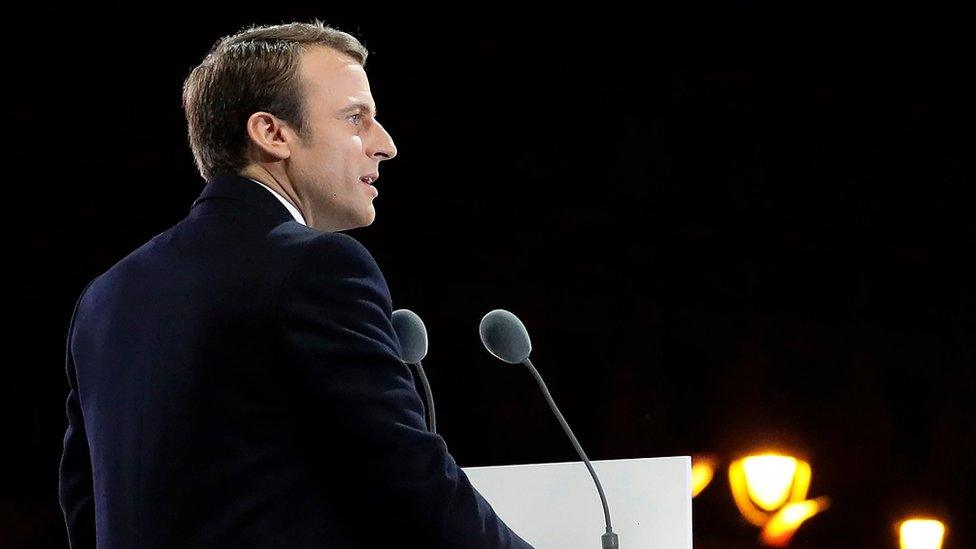
- Published19 June 2017
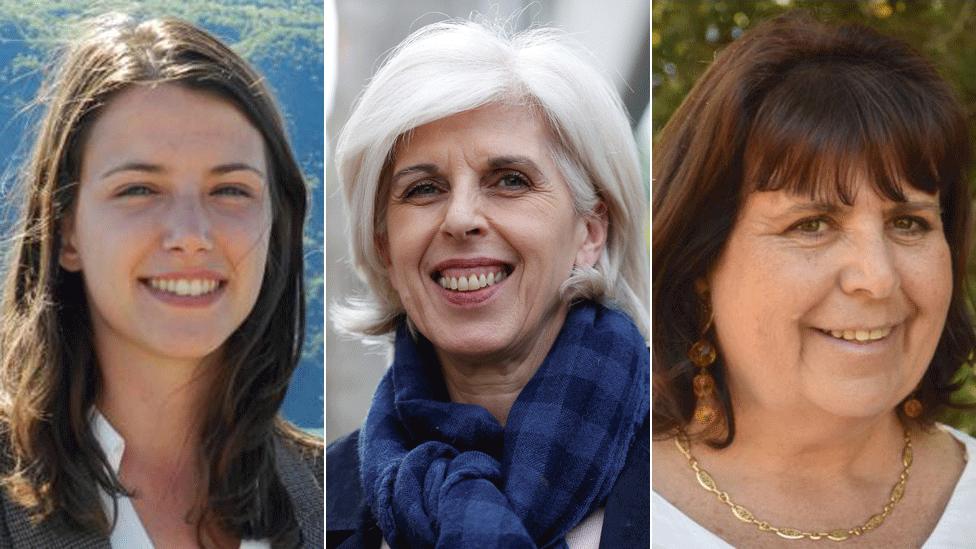
- Published6 June 2017
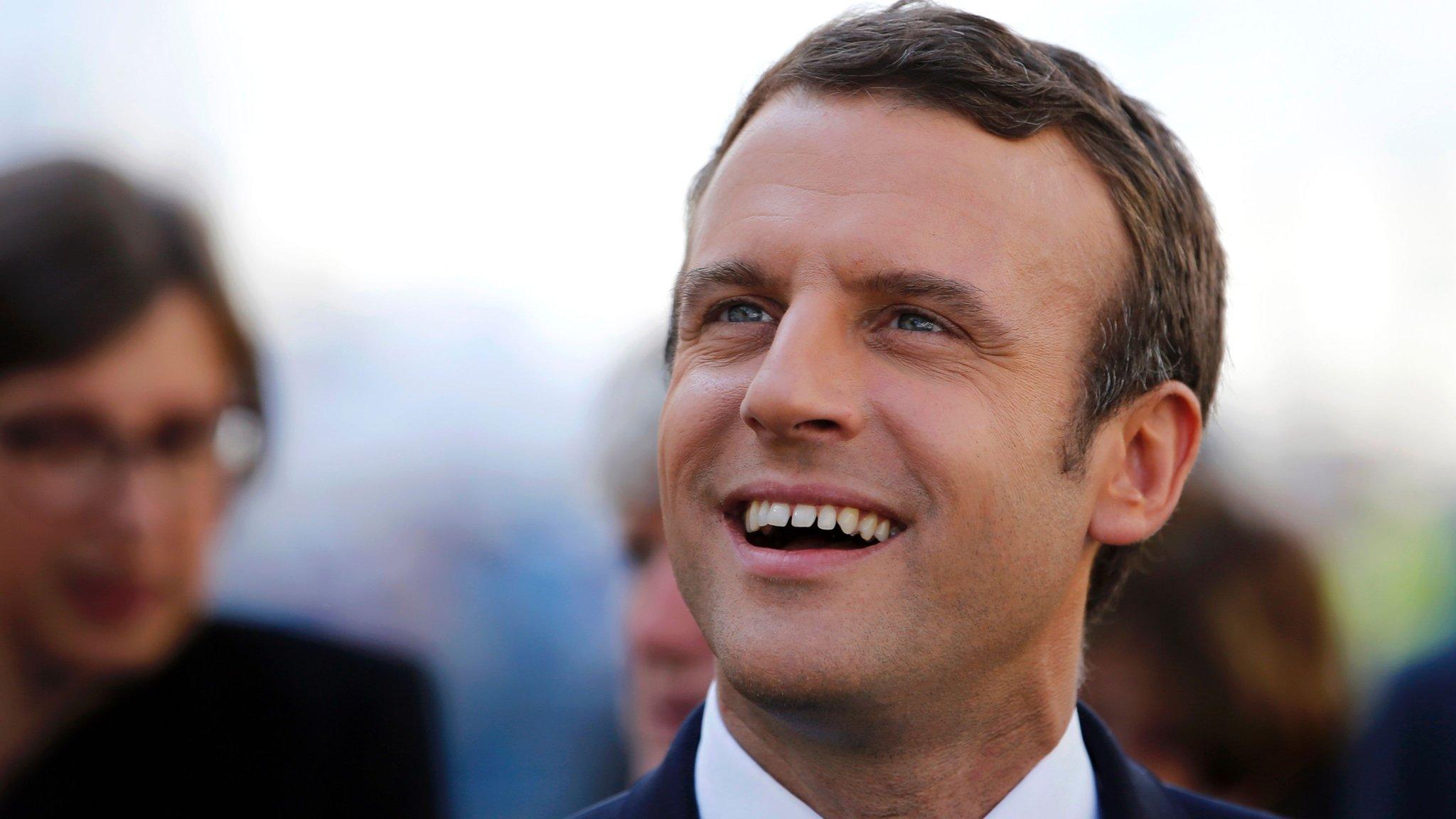
- Published3 June 2017
